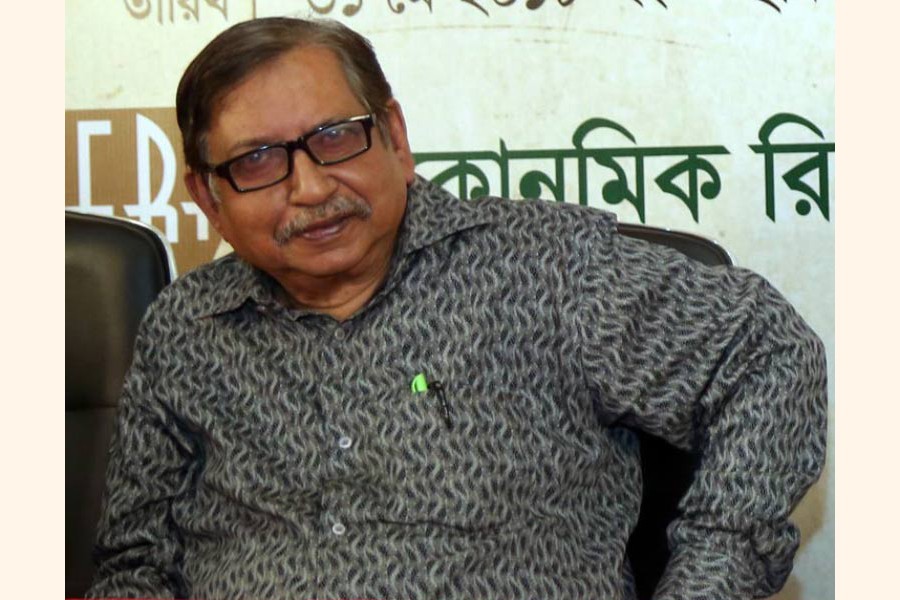I first met Moazzem Bhai in 2010 through a common friend Dr. Zaidi Sattar. Zaidi Bhai and I were colleagues at the World Bank and then we started our collaborative endeavour of the Policy Research Institute of Bangladesh (PRI). Zaidi Bhai had successfully persuaded Moazzem Bhai to make the Financial Express as PRI's media partner. Those were the early days for the little-known PRI. But Moazzem Bhai had no hesitation to back the PRI.
He took this collaborative relationship very seriously and challenged us in a variety of ways including asking for regular contributions on substantive macro-financial issues, helping his staff do good reporting through on-demand interviews and cross-checking of thoughts and ideas, and arranging training programmes for his staff. Some of the best pieces of PRI policy analysis written for the common citizens came out as articles done for the Financial Express.
Looking back and reflecting on PRI's partnership with the Financial Express, it is fair to say that Moazzem Bhai played an important role in shaping PRI's current standing as a leading macroeconomic policy research institution in Bangladesh. What did Moazzem Bhai see in the PRI back in 2010 when it was a brand-new institution and virtually unknown? This speaks volumes about his uncanny wisdom and smartness as a judge of people and their abilities.
His sound judgement and wisdom are well reflected as well in the way he groomed the Financial Express from a yet another daily newspaper to an analytical and well-rounded leading business and financial newspaper of Bangladesh. In this endeavour his business acumen and foresight are reflected in his ability to recognize the need for learning from globally-established financial newspapers like the Financial Times of London. The Financial Express benefitted a lot in improving its quality and appeal by its syndication agreement with the Financial Times of London.
Moazzem Bhai had a solid grasp on key business and financial challenges facing Bangladesh. He often participated in the PRI dissemination events and made incisive comments on policies and issues facing the business sector in Bangladesh. He was a regular participant in the bi-annual consultation meetings of the Bangladesh Bank-sponsored monetary policy statement. He would avoid endorsing populist stance on monetary policy and put his weight in favor of those of us who would argue against populism and instead stress the importance of prudent monetary policy management. It was particularly heartening that he understood the linkages between monetary policy, the balance of payments and the exchange rate-a subject that even many professional Bangladeshi economists often fail to recognize or acknowledge.
He was a journalist's journalist. His editorials tended to avoid extreme views and opted for opinions based on pragmatism and support for public welfare. Often, he would write his opinion about a complex business or financial subject but use plain language with a view to communicating with his fellow journalists. He was a careful editor and tended to avoid sensationalism in the news headlines. He issued clear instructions to his senior reporters to report carefully on sensitive subjects and cross-check their reporting with knowledgeable people. He believed in responsible journalism and promoted that for the Financial Express through instructions to his management team and staff and through his own editing.
He was a caring editor and believed in team work. I had a number of opportunities to attend his team meetings. He was collegial and would encourage participation and teamwork. He was a careful listener and gave space to his management team and senior staff to speak their mind. He encouraged learning and staff growth. The partnership with PRI was one such example of his effort to grow his team through learning. His leadership of the Economic Reporter's Forum was another example of his commitment to foster good and responsible economic journalism that was analytical and evidence based.
Moazzem Bhai was an excellent human being. Through the many years that I interacted with him, I always found him courteous, respectful and cordial. He never spoke ill of anybody. He had a great sense of humor. He was always down to earth and very easy to talk to and deal with. His human qualities made it possible for him to have so many friends and well-wishers. His non-confrontational approach and professional journalism made it possible for him to be well-regarded by both the intellectual community and the government officials.
He lived a full life without complaining. I always saw him in a happy and cheerful mood. The last time I met him was in January 2018 at a Bangladesh Bank monetary policy consultation meeting. He looked cheerful and happy as usual, although I heard him coughing and his chest appeared a bit congested. I had no clue then that he was seriously ill and that I would never see him again. True to his spirit as a cheerful and positive person he did not complain about his failing health and nor did he seek any sympathies.
I was at my home in Washington when I heard about his illness and visit to Singapore for treatment. He died a few weeks later on August 01, 2018 at a local hospital in Dhaka. His untimely death sends us a timely reminder of the fragile nature of human life. He taught us that life should be lived every moment that we have it uncomplainingly. He leaves behind good human values and a legacy of professional economic journalism that will inspire many young and upcoming economic journalists. May Allah bless him and rest him in peace in heaven.
Dr Sadiq Ahmed is Vice-chairman, Policy Research Institute of Bangladesh (PRI) [email protected]


